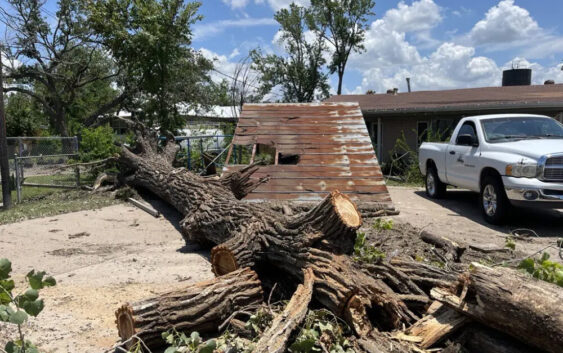- Austin adopts new map that greatly expands area at risk of wildfire
- CenterPoint Energy accelerates infrastructure improvements ahead of hurricane season
- Carolina Hurricanes playoff tickets go on sale Thursday
- Ask the Meteorologist: Why do tornadoes target Tornado Alley, Dixie Alley?
- Nonprofit closes distribution site that aided thousands after Hurricane Helene
Texas Department of Insurance shares rebuilding tips in Hurricane Beryl aftermath

When Beryl touched down on the Texas Gulf Coast early Monday, it was a Category 1 hurricane.
Wind speeds reached up to 80 miles an hour and, so far, at least seven people have been pronounced dead, and more than a million people in the Houston area were still without power Wednesday morning.
Thankfully, Beryl has since been downgraded to a tropical depression, which means that state officials, utility providers and everyday Texans have started to rebuild. But navigating the insurance portion of that process can be tricky for any Texan.
Ben Gonzales, communications specialist at the Texas Department of Insurance, joined Texas Standard with tips on how to navigate the process. Listen to the interview above or read the transcript below.
This transcript has been edited lightly for clarity:
Texas Standard: Can you talk briefly about what the Texas Department of Insurance is and how the agency plays a role when there’s a natural disaster?
Ben Gonzales: Yeah, the Texas Department of Insurance is a regulatory agency. We make sure that insurance companies are following Texas law.
Certainly, we’re not a first responder. So our role during the disaster comes during the recovery period. And that basically comes down to us telling the insurance companies, “be especially responsive to consumers during this recovery.”
And the other role we have is on the consumer side to provide information like this.
Yeah, a very important role, especially right now in the Houston area. Well, in most cases, flood damage is not something that’s covered by home insurance. But are there ways to recover losses for people who’ve been hit hard by the storm?
Yeah, flooding is certainly one of the big dangers in this particular storm. And that’s correct, is something we always try to remind consumers of – that their regular home or renter’s insurance does not cover flood damage. You’d need a separate flood insurance policy to protect your home from that rising water.
Most people get that coverage through FEMA, through the National Flood Insurance Program. And if your home is on the Gulf Coast, you might end up with a third policy to cover windstorms, like hurricanes and tornadoes.
Inland, your home insurance is going to cover those windstorm damage, but as you get closer to those coastal counties, many insurers exclude wind because of that risk and losses from storms like Beryl.
» RELATED: Tropical Storm Beryl: How to get help and help Texans
The Department of Insurance is advising those affected by the hurricane to get your claim started as soon as possible. Can you explain why this is so important for those who have property damage from the hurricane?
Yeah, that’s another thing that I’ve been repeating often this week.
If your home was damaged by Hurricane Beryl, chances are many of your neighbor’s homes were also damaged, and everybody’s going to be trying to schedule times for insurance adjusters to come out and assess damage. Multiply that by tens of thousands of policyholders, and it’s going to be a frustrating process.
So we say start as soon as you can. Call your company, get that appointment scheduled, and then start documenting any damage that you can see. Just walk around your home, take pictures or videos. Your insurance company may ask you to send those, or you can just have those at the ready in case they do.
Well, the Texas Department of Insurance is alerting people who need to rebuild their homes about contractor scams. What do folks need to be on the lookout for to make sure they’re not being taken advantage of?
That’s an unfortunate kind of reality – that disasters can draw a criminal element to the disaster area – or, at best, some unprofessional workers trying to make some money.
So TDI doesn’t regulate contractors or construction workers. But, we do have recommendations for consumers, and that’s to try to work with a local company if at all possible. That’s the only way you’re going to be sure that you can get them back if something’s not right.
Before you choose that contractor, get several estimates and check references. Taking some time to do this is probably going to go against all your instincts, because everybody wants to get started fixing things and get back to normal. But if you rush it, you could end up costing even more time and more money.
Yeah, in the long run. So all very important. Lots of good information. But where can consumers get some more help if they have other questions?
We do have a helpline here at TDI. It’s (800) 252-3439.
They can ask insurance questions or get help contacting their company. We can help put them in touch.